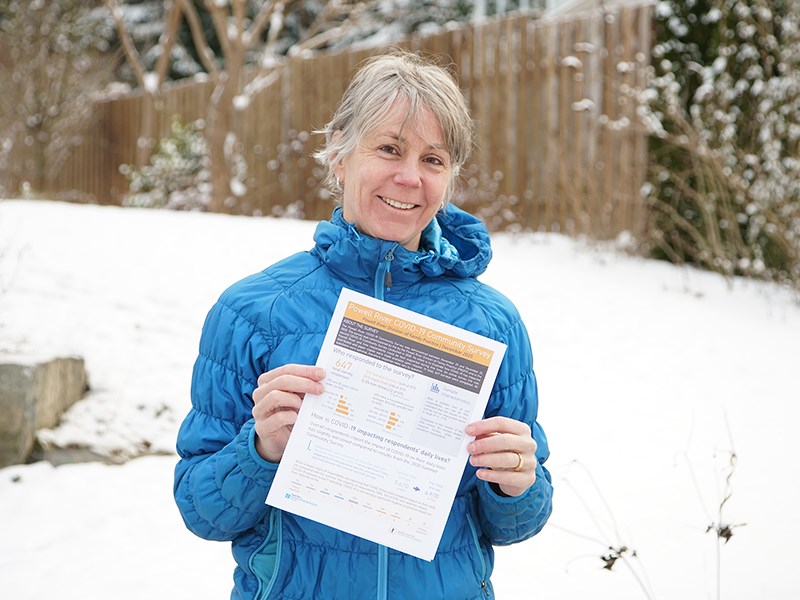Powell River Division of Family Practice has released results of its latest COVID-19 survey, with 647 people responding to the month-long survey, conducted in late 2020. This was the second COVID-19 survey conducted by the physicians and its intent is to illustrate how COVID-19 has impacted Powell River and how respondents could be best supported during this time.
Of the respondents responding to a question regarding gender, 76 per cent were female, 24 per cent were male and 0.3 per cent were nonbinary. A total of 71 per cent of respondents were 50 years old or older and 48 per cent had incomes higher than $60,000 per year.
Dr. David May, family physician and chair of the Powell River Division of Family Practice, said local physicians were pleased with the response.
“It was large enough to make the survey statistically significant, which is what we were aiming for,” said May. “We had hoped to have more representation from males, but overall, the response was large enough.”
The survey reveals the average rating of impact has changed between the two surveys. May said it’s probably not surprising that respondents reported the impact of COVID-19 has slightly worsened since the survey in the summer of 2020, and the greatest impact appears to be on people who are younger than 35 years of age.
“This is, of course, worrisome,” said May. “As the pandemic continues, it is more important than ever that we help people get access to mental health resources that can help them, and support each other with kindness, patience and by doing all we can to protect each other by following public health guidelines.”
May said the fact that 49 per cent of respondents caring for school-aged children reported their child/children’s mental health has worsened during the pandemic is an issue of concern.
“We are doing what we can to share resources that might be helpful to people who are struggling with children and the mental health impacts of COVID-19,” said May.
He said a number of resources are available, such as the ones shared in the physicians’ most recent newsletter: Doctor’s Notes. People can sign up to receive the newsletter at divisionsbc.ca/powell-river, or go to us6.campaign-archive.com/?u=4b3b832cf2&id=9458a12fa5.
The survey shows good compliance with the wearing of face masks indoors.
“We were pleased to see 95 per cent of respondents reported always wearing a face mask in indoor public settings,” said May. “This layer of protection is one of the key public health guidelines that helps keep us and our loved ones safe.”
Respondents to the questionnaire who have had a COVID-19 test and would recommend others do the same if they have symptoms was 96 per cent. If people are unsure about whether to get tested, they can use the BC COVID-19 self-assessment tool at bc.thrive.health.
May said a COVID-19 test is recommended for anyone who had contact with someone who tested positive for COVID-19 and has any one of the symptoms listed below; is experiencing symptoms as described below; feels unwell and is unsure about their symptoms. They should also contact their health-care provider or call 811.
For people who do not know if they had contact with someone with COVID-19, they need a COVID-19 test if they have new or worsening symptoms. People with one or more of these key symptoms need to seek testing as soon as possible: fever or chills; cough; loss of sense of smell or taste; difficulty breathing.
People experiencing two or more of the symptoms below for more than 24 hours that are not related to any other preexisting conditions should seek testing. These symptoms are: sore throat; loss of appetite; extreme fatigue or tiredness; headache; body aches; nausea or vomiting; diarrhea.
May said if people have only one of these symptoms, or a symptom not on this list, and they are able to manage the symptoms at home, they should stay home until they feel better.
“If you have any questions, or the symptoms don’t go away, contact your health-care provider or call 811,” he added.
The survey shows 85 per cent of respondents feel confident in the information they receive on COVID-19. May said local physicians have been working hard to provide the public with reliable, current, local information about COVID-19. Information and regular updates can be found at prcomplexclinic.com, via the weekly newsletter, or on the physicians’ social media pages (Facebook and Instagram) @prdivisionoffamilypractice.
The pandemic has changed the way people interact with their doctors, according to May. Local physicians do not want the pandemic to affect people’s medical care, he added.
“We are strongly urging people to seek care for any medical condition that needs attention,” said May. “We’ve been emphasizing in our communications that we are fortunate, locally, to have maintained low case counts of COVID-19, which means we are able to carry on regular medical care for patients.”
May said 83 per cent of survey respondents who received care from a family doctor or nurse practitioner through a virtual appointment reported this was an effective way to address their concern, but it’s important for people to know they are able to see their health-care provider in person if they need to or want to.



